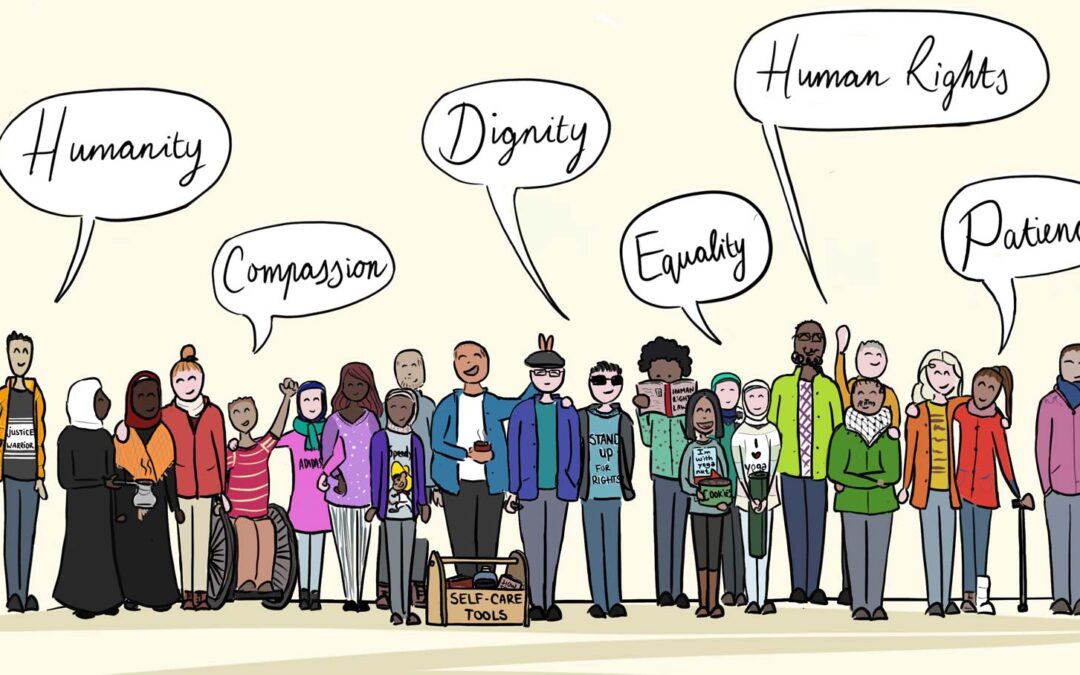image by Marieke VaNoon
The coronavirus pandemic is reconfiguring our world. Whilst we don’t know what the long-term consequences will be, it’s already clear that the worst effects will be felt by the most marginalised people. Moreover, the strengthening of states, emergency measures, global economic crisis and a rise in popular xenophobia pose grave threats to rights. When this is all over – and it will be – many governments won’t want to relinquish their new powers, presenting an unprecedented challenge to human rights.
Activists and their organisations have always played a pivotal role in advancing human rights. Within the context of this pandemic, an unprecedented shrinking of civic space and almost total public disengagement with rights discourse, we need strong and resilient human rights defenders and organisations more than even before. Yet, as we struggle to secure our own oxygen masks, we simultaneously face the challenge of rapidly reconfiguring how we do our work.
Over the past few weeks, I’ve been working intensively with leaders of human rights organisations to help them strategise, keep the work going and support staff to stay motivated and physically and mentally well. Based upon these conversations and two decades defending human rights, here’s four things that I see as vital to sustaining human rights work in these extraordinary times:
1. Your Human Rights Mission is More Important than Ever
Against a backdrop of emergency measures, chaos and fear, we’ve no choice but to ask ourselves: Who are we? And what do we stand for? Now, if you’ve read this far, I’m sure you know what we stand for. But since we’re here, a reminder: We stand for humanity, dignity, equality, non-discrimination, participation, accountability and a full spectrum of indivisible human rights. We stand up for the marginalised, for justice and for those most at risk.
Stop. Pause. Let that sink in. Ground yourself in our principles, right here and now. And now, get clear about one thing: Amidst all the noise, disruption and chaos, our core mission principles, and your role in defending them, have never been as important as now.
Even if your advocacy and workflows are disrupted for now, history shows that we have the ability to conquer even the toughest roadblocks. See things in perspective – the human rights project is a multi-generational program for change. We are, and always have been, in this for the long haul.
Yes, we need new strategies and ways of work, because our voices aren’t being heard right now. But, be patient. Think strategically. Don’t rush. This is a marathon, not a sprint. We are processing. We are re-configuring. We will find creative and impactful ways to do our work. We’ve done it before and we’ll do it again.
Most of all, don’t lose hope and don’t give up. If you’re struggling to focus on daily tasks or unsure what your best strategy is, return to your core principles – your raison d’être. Our principles provide hope and inspiration. And they guide all of our thoughts, actions and words.
2. Your Human Rights Mission Translates into Specific Responsibilities Towards the People Around You
I’ve spoken before about how core principles of humanity, dignity, non-discrimination, equality, transparency, participation, and accountability translate into specific ethical responsibilities vis-à-vis our stakeholders. It’s time to think practically about that. So just for a moment, put down that emergency law and ask yourself: What does it actually mean to translate our mission into actions and words? How can I live my principles in supportive and human-centred behaviour towards myself and everyone around me, including my colleagues? How can I show more patience, kindness, compassion and empathy right now?
3. Wellbeing Is More Important Than Ever
I’ve talked in past posts about the evidenced wellbeing crisis in the human rights sector, the elevated levels of chronic stress, burnout, and vicarious trauma amongst activists. My own research into remote human rights work shows that people working with traumatic content on what we call the “the digital frontline” are more likely to experience negative mental health impacts. A gentle reminder folks – these challenges have not gone away.
Far from it. From the conversations I’ve had, it’s clear that this pandemic has compounded and intensified preexisting wellbeing concerns. Some tell me about the cognitive dissonance they’re experiencing when colleagues carry on as if it were “business as usual.” Others speak about punishing deadlines to get pandemic related stuff out, triggering high levels of stress and distress. Yet others are consumed by utter existential dread – that feeling that we’ve no hope of having any impact in what’s become a single issue world. But mostly what I hear is the isolation, frustration, and anxiety arising because we are not being patient, nor are we communicating well.
Put your wellbeing radar on. Look after yourself. Look after your staff. You see, to compete in this marathon, we need to be sustainable, not burnt out.
Ask people how they’re coping. Evaluate workflows to minimise overexposure to troubling content. Regularly rotate staff working on the pandemic and human rights and other tough stuff. And if you’ve not done so already, do the leg work: Educate yourself about the occupational hazards of human rights work. Learn what you can do and reach out to people like me who can help you put a wellbeing strategy in place.
Yes, we need to formulate effective strategies and tactics. But, please don’t get lost and stray from who we fundamentally are: Our number one focus must be on looking after ourselves and treating the people around us with kindness, patience, understanding and respect.
It’s not just about walking our own talk. But it’s at the core of our ability to sustain our work: If we are to get human rights onto the agenda, we need healthy and resilient defenders and organisations who are equipped with creative strategies, suitable for the long haul.
4. Communicate. Communicate. Communicate.
What I’ve learnt is that everyone’s processing in very different ways. Yet, there’s one common thread: People need to talk and they need to be heard. You’ll never create effective strategies, nor be able to support colleagues, if you stick to formal email and group chats. Body language and facial expressions tell us a lot. Communication, connection and solidarity are crucial right now.
In practical terms, talk. Briefly, but often. Face to face. With the camera on. Don’t limit communication to a formal weekly team meet up, or the issues will pile up, increasing everyone’s stress. Make yourself completely accessible and be fully open to non-work-related chat. Allow yourself your humanity. Everyone’s brains are noisy and no one’s focusing well. It’s not a “business as usual” moment and it’s healthy to admit that.
Learn how to centre yourself before you get on a call. Stay away from social media and the news for at least 10 minutes prior. When you talk to your colleagues, you want to be totally present for them, not in a state of fight or flight, nor displaying negativity and fear. Show up with empathy, and be real. Most of all, communicate hope. Let everyone know that whilst we’re working out the the what and the how, our mission and everyone’s contribution could not be more crucial than it is right now.
If you are a defender or leader and you’d like support to think through how you can strategise and keep yourself and the people around you well, please reach out and we’ll set up a call.
Liz Griffin is a Social Justice Leadership Coach and Mentor who supports human rights activists and organisations to develop impactful strategies, navigate change and uncertainty and keep well.
Liz is also Extraordinary Lecturer, Centre for Human Rights, University of Pretoria (South Africa) and Fellow, Human Rights Centre and Armed Conflict and Crisis Hub, University of Essex (UK). She has over 25 years of experience working with the UN, NGOs and at universities, rising to the level of professor of international human rights law. Liz is an International Coaching Federation accredited Associate Certified Coach (ACC) and Senior Yoga Alliance Professional. She is also a partner, Human Rights Resilience Project.
You can find out more about Liz here.

